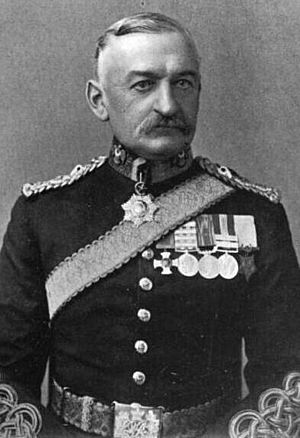Frank Rhodes (British Army officer) facts for kids
Quick facts for kids
Frank Rhodes
|
|
|---|---|

Col. F. W. Rhodes
|
|
| Birth name | Francis William Rhodes |
| Nickname(s) | Frank |
| Born | 9 April 1850 Saint Michaels, Bishop's Stortford, Hertfordshire, England |
| Died | 21 September 1905 (aged 55) Groot Schuur, Cape Colony |
| Place of burial |
Matobo National Park, Zimbabwe
|
| Allegiance | |
| Service/ |
|
| Years of service | 1873–1896; 1899–1903 |
| Rank | Colonel |
| Unit | 1st Royal Dragoons |
| Battles/wars |
|
| Awards |
|
| Relations | Cecil Rhodes (brother) |
| Other work |
|
Colonel Francis William Rhodes (born April 9, 1850 – died September 21, 1905) was a British military officer. He was a well-known member of the Rhodes family. His brother, Cecil Rhodes, was famous for his work in mining.
Contents
Frank Rhodes' Early Life and Military Career
Frank Rhodes trained to be a soldier from a young age. After studying at the Royal Military College, Sandhurst, he joined the 1st Royal Dragoons in 1873. He served in the British Army for 23 years.
He quickly moved up the ranks. In 1875, he became a lieutenant, and by 1884, he was a captain.
Adventures in the Sudan
Frank Rhodes took part in the Sudan Campaign. He helped Sir Herbert Stewart and joined the Nile Expedition. This group tried to rescue General Charles George Gordon in Khartoum.
Rhodes was at important battles like El Teb and Tamai. At the Battle of Abu Klea, he showed great bravery. Several horses were shot from under him during the fighting.
For his service in Sudan, he was promoted to major in 1885. He also received special recognition as a lieutenant-colonel. He earned several medals, including the Distinguished Service Order in 1891.
New Roles and Challenges
In 1886, Rhodes started working on staff duties away from his regiment. He became a colonel in 1889. From 1890 to 1893, he was a military secretary to the Governor of Bombay, Lord Harris.
In 1893, he was the chief of staff for Sir Gerald Herbert Portal's mission to Uganda. Rhodes also briefly served as the Administrator of Mashonaland. He was a military member of the government in Matabeleland under Leander Starr Jameson.
The Jameson Raid and Its Aftermath
A very difficult time for Rhodes was the Jameson Raid. He was a key member of the Reform Committee in Johannesburg. This group wanted to change the government of the Transvaal Republic. They hoped to make things better for the "Uitlander" population, who were people living in Transvaal but not from there.
After the Jameson Raid in December 1895, members of the Reform Committee faced serious charges. Rhodes and other leaders were initially given a very harsh sentence in April 1896. This was later changed to 15 years in prison. In June 1896, all committee members were released after paying a large fine.
Because he supported Jameson, the British Army removed Rhodes from active duty. After his release, he quickly joined his brother Cecil. He also worked with the British South Africa Company during the Second Matabele War.
Later Years and Legacy
In 1898, Frank Rhodes joined Sir Herbert Kitchener's Nile expedition. He worked as a war correspondent for The Times newspaper. At the Battle of Omdurman on September 2, he was shot and badly hurt in his right arm. Because of his service in that campaign, he was allowed to return to the army's active list.
During the Second Boer War, Rhodes continued to work as a war correspondent. He was stuck in the Siege of Ladysmith for a long time. He also helped with the relief of Mafeking. He was praised by Lord Roberts and became a Companion of the Order of the Bath.
When his brother Cecil died in 1902, Frank took over Dalham Hall. He built a hall in the village to remember Cecil. After leaving the Army in 1903, he became the managing director of the African Trans-Continental Telegraph Company. He held this role until his death in 1905 in Groote Schuur, Cape Colony.
 | Ernest Everett Just |
 | Mary Jackson |
 | Emmett Chappelle |
 | Marie Maynard Daly |

